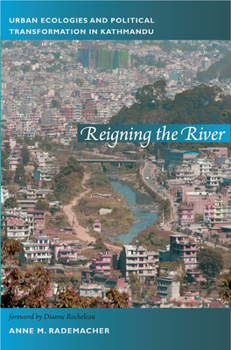Reigning the River: Urban Ecologies and Political Transformation in Kathmandu
(Part of the New Ecologies for the Twenty-First Century Series)
A major contribution to the nascent anthropology of urban environments, Reigning the River illuminates the complexities of river restoration in Kathmandu, Nepal's capital and one of the fastest-growing cities in South Asia. In this rich ethnography, Anne M. Rademacher explores the ways that urban riverscape improvement involved multiple actors, each constructing ideals of restoration through contested histories and ideologies of belonging. She examines competing understandings of river restoration, particularly among bureaucrats in state and conservation-development agencies, cultural heritage activists, and advocates for the security of tens of thousands of rural-to-urban migrants settled along the exposed riverbed.
Rademacher conducted research during a volatile period in Nepal's political history. As clashes between Maoist revolutionaries and the government intensified, the riverscape became a site of competing claims to a capital city that increasingly functioned as a last refuge from war-related violence. In this time of intense flux, efforts to ensure, create, or imagine ecological stability intersected with aspirations for political stability. Throughout her analysis, Rademacher emphasizes ecology as an important site of dislocation, entitlement, and cultural meaning.
Format:Paperback
Language:English
ISBN:0822350807
ISBN13:9780822350804
Release Date:October 2011
Publisher:Duke University Press
Length:264 Pages
Weight:0.65 lbs.
Dimensions:0.7" x 6.1" x 9.1"
Customer Reviews
0 rating





